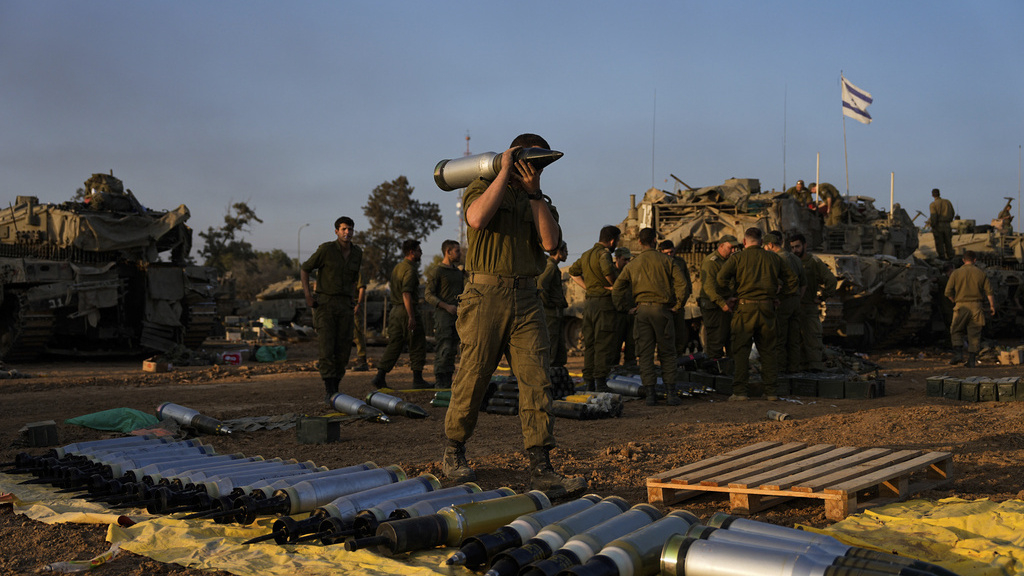
Israel pulled thousands of troops from Gaza in a possible sign of a scaled-back offensive
The Gaza Strip During the Fourth Israeli War: Reports of Mass Shootings and Massacres in Khan Younis and Nuseirat
Thousands of Israeli troops were leaving the Gaza Strip, a move that could pave the way for a new phase of fighting against the Hamas militant group.
Word of the drawdown came ahead of a visit by Secretary of State Antony Blinken to the region and after the Biden administration bypassed Congress for the second time this month to approve an emergency weapons sale to Israel.
The militant group Hamas launched an attack on Israel in October which caused the death of 1200 people. More than 200 people were taken hostage.
In a briefing Sunday that first announced the troop withdrawal without specifying how many forces were leaving, army spokesman Rear Adm. Daniel Hagari did not say whether the decision meant Israel was launching a new phase of the war.
Over 20,000 people have been killed in the Gaza Strip since the beginning of the war, most of them civilians, according to the local health authorities. According to the UN, half of Gaza’s 2.2 million people are at risk of starvation because of aid delivery restrictions and aid workers not being able to move safely.
In Khan Younis, where Israel is believed to have thousands of troops, residents reported airstrikes and shelling in the west and center of the city. The military and Islamic Jihad had reported battles.
The Palestinian Red Crescent said on X, formerly Twitter, that it transported several dead and injured following a strike late Sunday in the Beach Street in Khan Younis. Medics carrying casualties to ambulances in nighttime footage.
“It’s our routine: bombings, massacres and martyrs,” said a Palestinian from the Nuseirat camp. He said he could hear sporadic explosions and gunfire in Nuseirat and in the nearby Bureij and Maghazi camps.
Gaza’s Health Ministry said Monday that 156 people had been killed in the past day. The Israeli military said an airstrike killed a Hamas commander in Deir al-Balah.
The troop drawdown and the military’s transition to a new phase of the war in the Middle East: An Israeli Brigade General’s Perspective
Shlomo Brom, a retired brigadier general once in charge of strategic planning in the Israeli military, said the troop changes may be a result of the U.S. pressure. He stated that it indicated a shift by Israel in how it was conducting the war.
Of the 172 soldiers who have been killed in the ground operation, 18 have died in friendly fire, and 11 were killed by weapons or equipment malfunction.
Israel’s military operations in Gaza had already been slowing down and its air campaign had become more limited, said Amos Harel, the military affairs analyst for the left-leaning Israeli newspaper Haaretz. The military is trying to put the war on a more sustainable footing, but is making the transition “without announcing it,” he said.
Analysts say Mr. Netanyahu has been reluctant to declare any winding down of the war and has delayed any serious discussion of who will administer Gaza in the aftermath, not least because of the divergent opinions among his fractious, right-wing coalition partners and his desire to keep his government from falling apart.
Mick Mulroy, a former top Middle East policy official at the Pentagon, said that the troop withdrawal “does not mean that the war is close to conclusion,” but that it could mean “a lower intensity phase in the near future.”
It is expected that this move will greatly alleviate economic burdens and allow them to gather strength for their upcoming activities in the next year.
Secretary of State Antony J. Blinken is expected to return to Israel in early January for further talks on the war, according to U.S. officials. Last week, President Biden pressed Prime Minister Benjamin Netanyahu in a tense conversation to take a more surgical approach to the war, using special forces to attack the leaders and infrastructure of Hamas, the militant group that has controlled Gaza.
The withdrawal is a clear indication that the fight is entering a new phase, as was requested by the US, according to the retired U.S. Special Operations commander. “We will see more precision strikes and precision operations against Hamas leadership and Hamas militants going forward.”
Yossi Kuperwasser, a retired Israeli brigadier general, agreed that the drawdown reflected the military’s gradual transition to that next part of the war, even as intense battles continued in southern Gaza.
General Kuperwasser said that in a lot of northern Gaza, they are ready to advance to the next stage of the fighting. “We can dilute our forces there, because we’ve taken control. You need less than it takes to get it taken over.
Yo Av Gallant, Israel’s defense minister, said on Monday that residents of seven evacuated Israeli towns near the border with Gaza can return home soon.
Palestinians, Israelis and Palestinians aren’t safe – they’re afraid. Israel’s military strikes down in the wake of the Gaza rocket attack
They have sought shelter in overcrowded, increasingly unsanitary hospitals, schools and makeshift encampments, where the search for food and water has become a daily ordeal.
Hanin Abu Tiba, a 27-year-old English teacher sheltering at Nasser Hospital in Khan Younis, described an atmosphere of desperation at the hospital, which has been flooded with wounded patients and hungry refugees. The crowd of displaced people descend on the trucks in an attempt to get food when aid convoys arrive. She said police officers in Gaza watch the chaos unfold.
Ms. Abu Tiba claimed that people are fighting and pushing each other to get dates. “As soon as people hear that something’s arrived, everyone starts running.”
Shortly after midnight — just after Israelis and Palestinians rang in the New Year — Hamas took responsibility for a rocket barrage from Gaza that sent scores fleeing to bomb shelters in central Israel.
Israel’s military said on Monday that it hit targets in the northern and central parts of Gaza. There was no immediate confirmation by Hamas.
The Supreme Court of Israel struck down a part of Prime Minister Benjamin Netanyahu’s judicial reform plan, the same day that confirmation of the planned troop drawdown came. The plan was the cause of deep divisions in Israel and posed a threat to the military’s readiness before the war started.
Netanyahu will press on with the offensive until Hamas is defeated and all the hostages in Gaza are freed.
Over 100,000 people in overcrowded shelters or tent camps are being forced to live in Israeli safe areas since the war has displaced 85% of Gaza’s population. Palestinians don’t feel safe because they don’t feel safe.
Israeli pulls thousands of troops from Gaza, a possible sign of scaled-back offensive: “This is not a day for political arguments,” said Israel’s Supreme Court
The Gerald R. Ford aircraft carrier strike group will leave after many months of extra duty, the Navy announced on Monday. The Ford will be replaced by the amphibious assault ship the USS Bataan and its accompanying warships.
A reporter for the Associated Press saw 17 bodies at a hospital in central town of Deir al-Balah, including four children, after a missile struck a house.
In Israel, Kibbutz Be’eri, one of the communities hit by Hamas on Oct. 7, announced Monday that Ilan Weiss, who was thought to have been kidnapped, is now believed to be dead. Weiss’ daughter, Noga Weiss, 18; and wife, Shiri Weiss, 53; were held in captivity in Gaza and released on Nov. 25 during a weeklong cease-fire.
The Israeli Supreme Court’s landmark decision to strike down part of Netanyahu’s planned judicial overhaul could reopen the fissures in Israeli society that preceded the war against Hamas.
The War Cabinet member, rival of Netanyahu’s who joined, called for the sides to put their differences aside and focus on the war. “These are not days for political arguments. There are no winners and losers today,” he said.
In Monday’s decision, the court narrowly voted to overturn a law that prevents judges from striking down government decisions they deem “unreasonable.” The first part of the government’s plan to limit the power of unelected judges was passed in July.
Israel’s close battles with Hezbollah militants in Lebanon, to the northern hemisphere, and in neighboring Syria
Israel has engaged in near-daily battles with Hezbollah militants in Lebanon, to Israel’s north, and struck Iranian-linked targets in neighboring Syria as well. Israel’s warplanes and drones struck several areas in southern Lebanon, including a strike on the village of Kfar Kila that killed three people, state media and security officials said. Hezbollah said the three were some of its fighters.
The United States has sent warships to the Mediterranean and Red Seas, providing protection for Israel and underscoring concerns that the fighting could widen.

